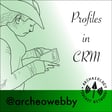Become a Creator today!Start creating today - Share your story with the world!
Start for free
00:00:00
00:00:01

Ryan Gerstner - Episode 69
Profiles in CRM features short interviews with CRM professionals from all experience levels and educational levels. I ask a standard list of questions and see how each person answers them based on their experience.
Recommended
Transcript
Introduction to Profiles in CRM Podcast
00:00:01
Speaker
You are listening to the Archaeology Podcast Network. The Archaeology Podcast Network is sponsored by Codify, a California benefit corporation. Visit codify at www.codifi.com. This is Ryan Gerstner and you're listening to Profiles in CRM.
00:00:21
Speaker
Welcome to Profiles in CRM, Episode 69. I'm your host, Chris Webster. Profiles in CRM asks CRM professionals nine simple questions. The answers vary wildly depending on their experience and education. Because of the nature of contract archaeology and how small this field really is, some people choose not to reveal their name or the company they work for. Stay to the end of the show to hear how you can have a chance to answer these same questions.
Meet Ryan Gerstner: Background and Experience
00:00:42
Speaker
All right, we're here on Profiles, and here's the first question. What is your name, and who do you work for? My name is Ryan Gerstner. I work for SWCA. Okay, and what's the highest degree you've earned? A Bachelor's of Science in Anthropology at Utah State University. Awesome, and how long have you been working in CRM? About three years now. Okay, and where have you worked? What states have you worked in?
00:01:04
Speaker
Primarily Wyoming, Utah, some Colorado work. Let's see, a three-month gig in Florida, and now I've been in California the last eight months, so. Florida was enough for the East Coast one. Yeah, done. What is the position you usually have in CRM projects, and what is the highest position you've ever held? So like, you know, field tech, crew chief kind of thing. Well, yeah, typically I've been, I guess, the field tech level more recently, taking the
00:01:31
Speaker
through the field lead position. But working solo, it's a lot of, I mean, you kind of decide your position, you might as well call it field director, making all the calls in the field. Army of one. Exactly.
Highlights of Working in CRM: Ryan's Perspective
00:01:44
Speaker
What is the best thing that's happened to you that's related to being an archaeologist? And that can be personal or professional. And I don't mean meeting me here at the SCAs. OK. Well, that's what I was going to go with. Other than that, probably just traveling, meeting new people, other crazy archaeologists, and getting to see a lot of the US. Nice.
Improving CRM: Respect and Aspirations
00:02:03
Speaker
What is the biggest thing that you would change that would make being a CRM archaeologist better? Let me think.
00:02:10
Speaker
Probably maybe field tax not being treated as disposable employees. I think that'll help with the quality of work and also quality of the science. What is your career goal in CRM? Where do you see yourself in 10, 20, 30 years?
00:02:31
Speaker
30 years. Well, hopefully, field director sooner than that. And who knows, project manager, PI eventually. Nice.
00:02:42
Speaker
All right, final question.
Advice for Undergrads: Exploring Opportunities
00:02:43
Speaker
If you could give an undergrad thinking about a career in CRM one piece of advice, what would it be? Let's see. This one probably gets said a lot, but diversify, have multiple skills, whether it's historic. Also, you can do other things except for just archaeology on the consulting world, even with an anthro degree.
00:03:03
Speaker
You can be a paleontological technician, even what you can get into wildlife if you have the right skills. So maybe learn your dinos and you might end up on a paleo monitoring gig.
Listener Participation and Podcast Editing
00:03:20
Speaker
Show notes for this and all episodes can be found on the Archaeology Podcast Network website at www.archaeologypodcastnetwork.com/. At that page you'll also find a form that you can fill out so you can be interviewed on the show. Interviews take less than 30 minutes and you don't need any special equipment. Thanks for listening and I'll see you in the field.
00:03:42
Speaker
The show is produced by Chris Webster and Tristan Boyle and was edited by Chris Webster. This has been a presentation of the Archaeology Podcast Network. Visit us on the web for show notes and other podcasts at www.archaeologypodcastnetwork.com Contact us at chrisatarchaeologypodcastnetwork.com
